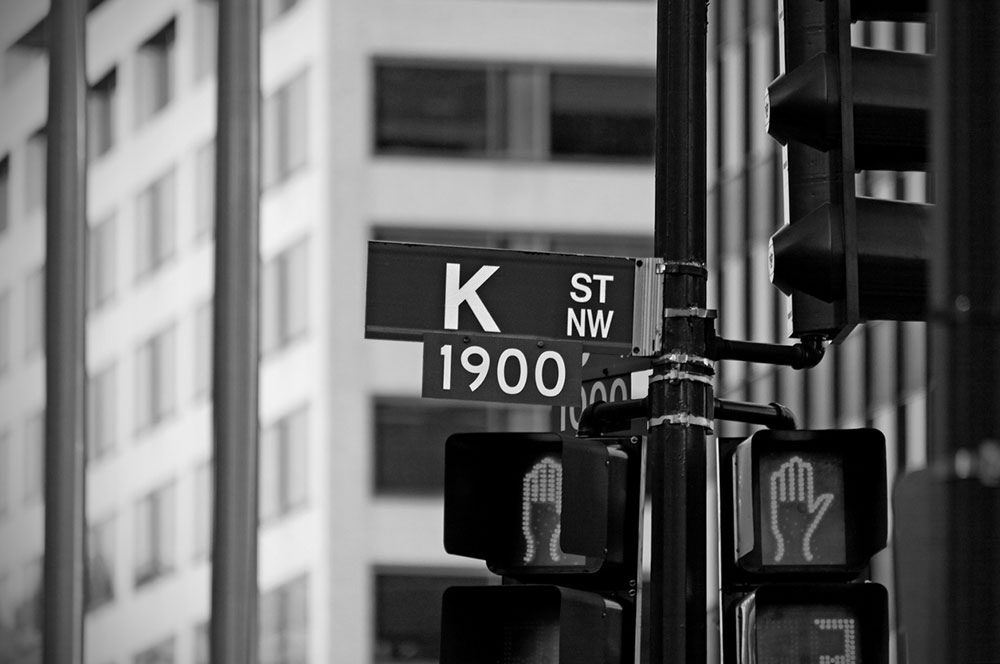From Politician to Lobbyist
IPR’s Silvia Vannutelli explores how state lobbying laws influence who runs for office and political competition
Get all our news
We think we contribute to this literature by really providing new evidence on one particular type of career prospect—in this case lobbying on the decision to run for a state legislator seat.”
Silvia Vannutelli
IPR economist

K street in Washington, D.C. is often associated with lobbying and lobbying organizations.
On May 2, 2023, four ComEd employees, including former ComEd lobbyist Mike McClain, were convicted of trying to corruptly influence Illinois Speaker of the House Michael Madigan. McClain, an ex-Illinois state legislator who later became a lobbyist, used his political connections to get favorable legislation passed in exchange for money, contracts, and jobs for Madigan allies.
The scandal highlighted the conflict that can occur when elected officials take lucrative lobbying jobs after leaving office and use their access to lawmakers to influence legislation.
In an effort to prevent corruption, many states have adopted revolving door laws, which require a “cooling off period” mandating a break for politicians before becoming lobbyists. On average, state laws require politicians to wait one to two years before registering as lobbyists. Florida recently implemented the strictest lobbying law of any state in the U.S., with a six-year lobbying ban.
“The key idea is that usually the value of connections decay over time, and there is evidence for that,” IPR economist Silvia Vannutelli explained, which can reduce the risk of corruption.
But there may be unintended consequences to these laws, according to Vannutelli, who is investigating how revolving door laws influence who runs for office and how long elected officials decide to stay in office. She says research on political selection, or who enters politics, shows that both the quality and quantity of candidates usually depends on the cost of running, including career opportunities that might be available to these individuals when their term ends.
“We think we contribute to this literature by really providing new evidence on one particular type of career prospect—in this case lobbying—on the decision to run for a state legislator seat,” Vannutelli said about the research she and her colleagues are conducting.
Using biographies of state legislators from 1972 to 2016 and lobbying activity tracked through the website FollowTheMoney.org, Vannutelli and her colleagues compare the careers of state legislators from states that adopted revolving door laws between 1962 and 1998 to states that adopted these laws between 1998 and 2017.
Within a year of leaving office, Illinois, with less restrictive laws around lobbying, had the most state legislators that registered as lobbyists compared to any other state. Nevada and Arizona had the most state legislators who eventually became lobbyists at any point after leaving office.
When they looked at former politicians’ careers, the researchers find that revolving door laws decrease the chances that legislators register as lobbyists after leaving office. They also discovered that after states adopted these laws, candidates ran in more uncontested elections, driven by fewer potential challengers entering races. The lack of competition increased the incumbents’ chances of winning elections, said Vannutelli.
While Vannutelli and her colleagues are still collecting data on legislators and plan to expand the dataset they are using, their preliminary results suggest that these laws decrease competition in state level elections. And this, she says, may have implications for the quality of candidates that decide to run, public policy, and the function of state governments.
“There is quite good evidence that political competition is important for both candidate quality and public policy quality,” Vannutelli said. “There also has been some other evidence in the past that the electoral turnover is good for governance and performance.”
Silvia Vannutelli is an assistant professor of economics and an IPR fellow.
Photo credit: iStock
Published: December 15, 2023.


